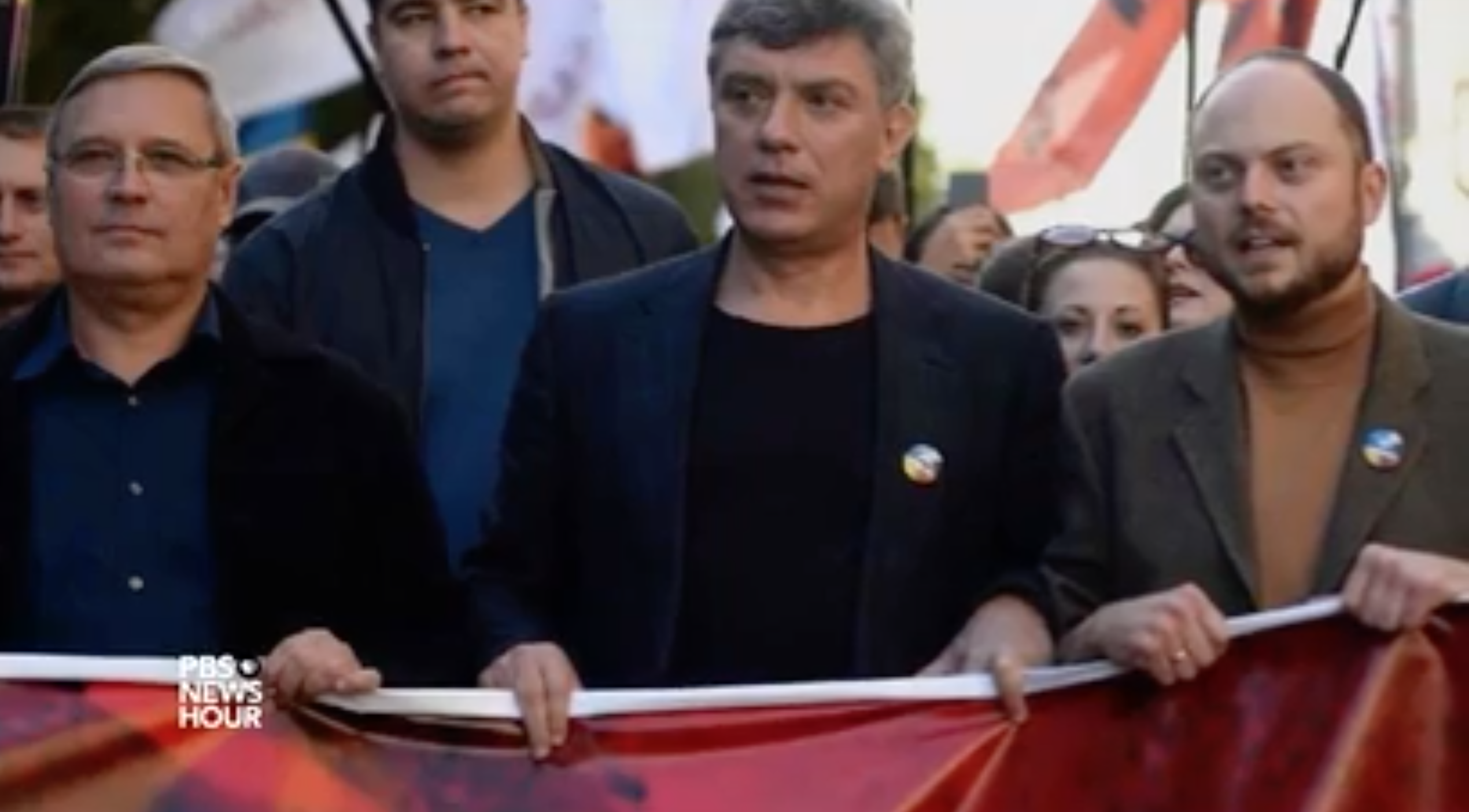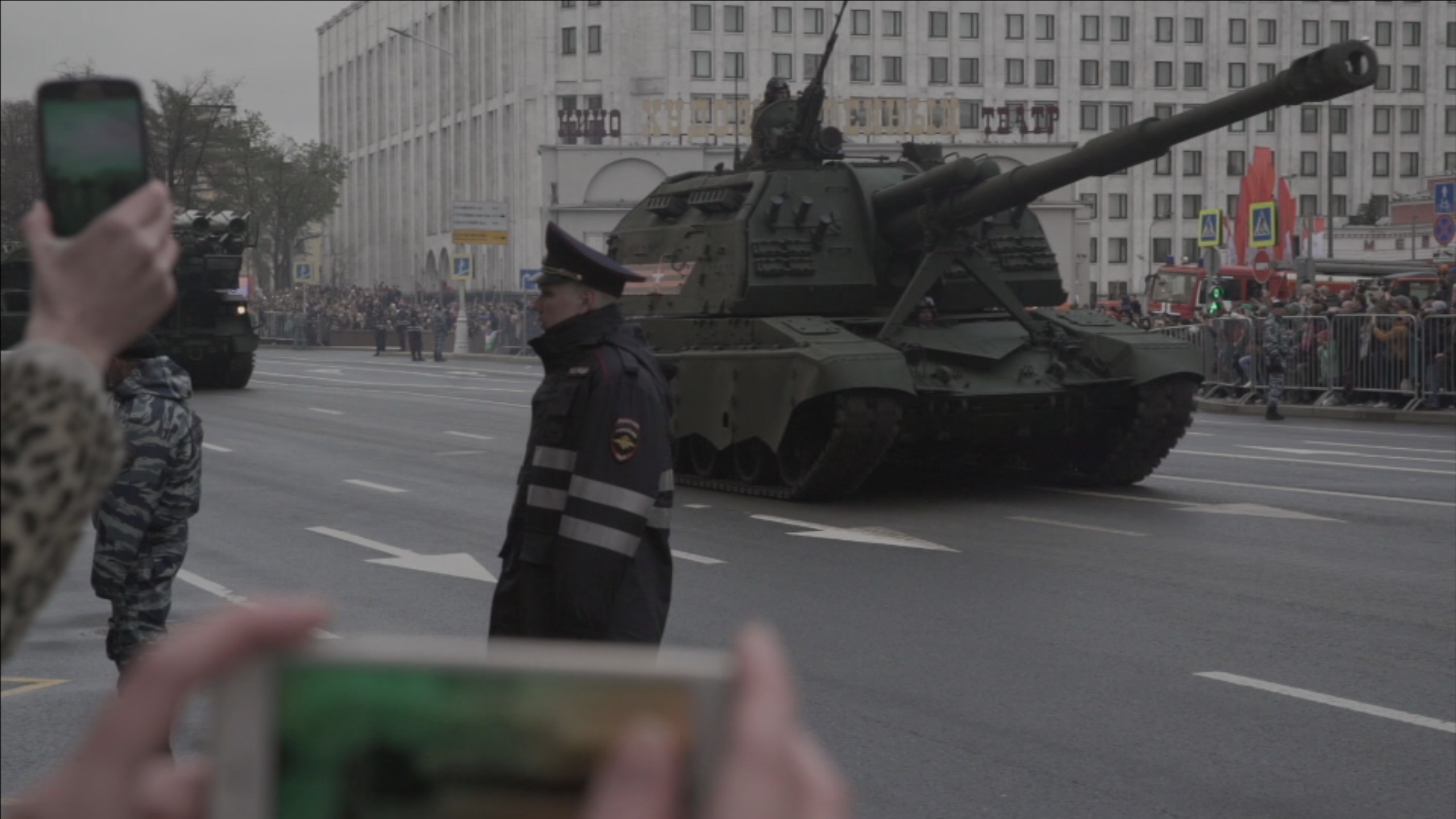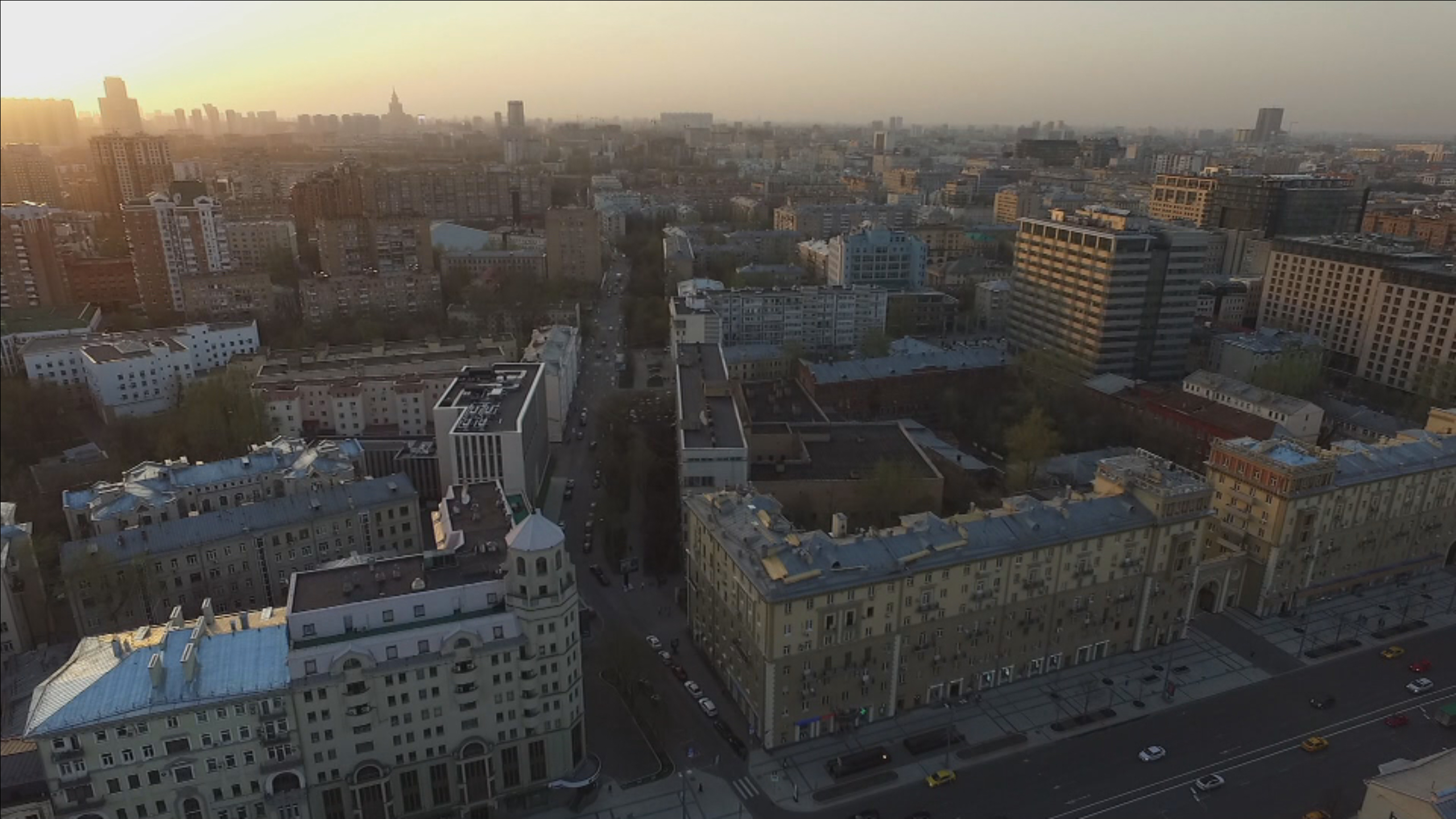
JUDY WOODRUFF: We return to our series Inside Putin's Russia — tonight, the fate of some of the Kremlin's opponents.
According to one study, in the past three years, 38 prominent Russians have been murdered or died suspiciously. The high mortality rate among some Russian critics has a long history. But critics say it is emblematic of how President Vladimir Putin runs today's Russia.
Special correspondent Nick Schifrin and producer Zach Fannin report from Moscow.
NICK SCHIFRIN: In today's Russia, there are consequences to criticizing the state. Police tell protesters their rally isn't sanctioned.
They are asking President Vladimir Putin not to run for reelection. This demonstration is sponsored by the opposition group Open Russia. In Saint Petersburg, and across the country, police arrested more than 100 protesters.
VLADIMIR KARA-MURZA, Vice Chairman, Open Russia: These democratic opposition activists are being arrested and given lengthy prison sentences. It is members of the democratic opposition who are being forced into exile, or harassed, or attacked, or murdered.
NICK SCHIFRIN: Thirty-five–year-old Vladimir Kara-Murza is Open Russia's vice chairman. He is an outspoken activist, demonstrating against Putin and organizing protests. We first sat down with him late last year.
VLADIMIR KARA-MURZA: We believe in the rule of law. We believe in human rights. We believe that Russia should enjoy the same democratic institutions that the rest of Europe enjoys.
NICK SCHIFRIN: To try and create those democratic institutions, he teamed up with the man he calls his mentor, Boris Nemtsov, a former deputy prime minister who became the country's leading dissident.
The two traveled to Washington to highlight the mysterious death of Sergei Magnitsky, a lawyer who exposed corruption among senior officials. Nemtsov and Kara-Murza convinced the U.S. Congress to freeze the assets of Russians believed connected to Magnitsky's death.
VLADIMIR KARA-MURZA: These people in the current Russian regime who rule like to keep their money, their assets in the West. They want to vacation in the West. They send their kids to schools to the West. And this personal accountability may well be the only thing that will make them think twice.
NICK SCHIFRIN: A little more than two years later, Nemtsov was assassinated a few hundred feet from the Kremlin's walls. His death was brazen and shocking.
This is the spot where Boris Nemtsov was killed. And you can see the corner of the Kremlin, right there, just a few hundreds yards away, and you can see the memorial for him that's on this bridge.
Today in Moscow, a court sentenced five people in Nemtsov's murder. Whether or not they were the masterminds, they permanently silenced Nemtsov's outspoken criticism.
Kara-Murza believes someone used poison to silence him too.
VLADIMIR KARA-MURZA: And I started suddenly feeling really, really sick, and within a space of 15 to 20 minutes, I went from feeling completely normal, like I am now, to having a really rapid heart rate, sweating, palpitation. I started vomiting, and then I just lost consciousness.
Kidneys, I think went first. Then it was the heart, the lungs, the stomach, the liver, everything. Everything just shut down. So I have no doubt that this was a deliberate attempt to murder, based on my political activities, motivated by my activities in the Russian opposition.
NICK SCHIFRIN: There are people who are working as opposition who are not targeted. What is the line that you apparently crossed?
VLADIMIR KARA-MURZA: There's the clear line between just saying things that are against the regime, and it's a totally different thing to go after their own personal interests, after their pockets.
NICK SCHIFRIN: The history of assassination goes back decades. In 1940, Leon Trotsky was killed with an ice axe. In 2006, crusading Russian journalist Anna Politkovskaya was murdered.
And in 2014, Alexander Litvinenko, a former intelligence agent who accused Putin of ordering Politkovskaya's death, was killed by radioactive tea.
Denis Voronenkov was a pro-Putin lawmaker who defected to Ukraine and became a Putin critic. In March, he was walking down the street in Kiev when a gunman shot him three times. His body bled out on the sidewalk in the middle of the day.
Maria Maksakova is his widow.
MARIA MAKSAKOVA: I was dreaming about my first spring in Kiev with Denis. I was dreaming so desperately.
At first, I thought it's better not to be born at all when you lose something like that.
NICK SCHIFRIN: Maksakova lives in Kiev, where she is raising their son.
In Moscow, she and Voronenkov were both lawmakers allied with Putin, and they enjoyed the spoils that come from power. But he'd also been an investigator who uncovered corruption in the Russian intelligence agency, the FSB.
Who do you think killed your husband?
MARIA MAKSAKOVA: He had certain enemies. And these enemies are in the FSB. The anti-corruption teams that he would investigate from here, that is loss of money and loss of influence, loss of everything, positions.
And that was something that they would not let him do.
NICK SCHIFRIN: Russia calls her claim a fabrication. But his death fits a pattern. A once-loyal family member becomes an outspoken opponent and ends up dead.
MASHA GESSEN, Author/Activist: A mafia family, you can be born into, you can be adopted into it. You can't leave it voluntarily. People who have tried to leave the Putin family voluntarily have not fared very well.
NICK SCHIFRIN: Masha Gessen is a Russian journalist, author, and prolific anti-Putin activist.
You have been dubbed by some an enemy of the state. Are you an enemy of the state?
MASHA GESSEN: Well, I am certainly an enemy of the mafia state. Absolutely, yes. I'm not an enemy of the Russian state.
NICK SCHIFRIN: Gessen was the first journalist blacklisted by Putin's Kremlin. She's also been targeted because she's a lesbian who's raising adopted children.
WOMAN (through interpreter): He was born by a woman I don't know and first met when he was 2.
NICK SCHIFRIN: In 2013, she helped lead a video campaign criticizing an anti-gay propaganda law. It helped condone homophobia and attacks on gay Russians, and Gessen argues the law explains how Putin rules.
MASHA GESSEN: The autocrat needs everybody out in the street with flags aloft. That is primarily the need for mobilization. To have mobilization, you need to have enemies. You can have LGBT people as enemies today, and then you can have Americans tomorrow, and keep the LGBT people in your back pocket and then pull them out when you need them again.
NICK SCHIFRIN: And Gessen says above it all is a boss served by loyal lieutenants, who don't need explicit instructions to launch attacks.
MASHA GESSEN: The patriarch of the family will say, do I always have to tell you what to do? Like, don't you know what the right thing to do is?
NICK SCHIFRIN: Does the Kremlin kill its political enemies?
SERGEY MARKOV, Russian National Strategic Council: One hundred percent sure not.
NICK SCHIFRIN: The Kremlin declined our interview request. But Sergey Markov, a member of Putin's party and Russia's National Strategic Council, reflects the Kremlin's defense, counterpunch and embrace conspiracy theories, starting with the assassinated opposition leader Boris Nemtsov.
SERGEY MARKOV: Who organized his killing? I strongly believe that it's terrorist organization SBU, intelligence service of Ukraine.
NICK SCHIFRIN: Ukraine killed Boris Nemtsov?
SERGEY MARKOV: Not Ukraine. Ukraine is country run by terrorists, but terrorists who captured Ukraine, they killed Boris Nemtsov.
NICK SCHIFRIN: But it's more than Nemtsov. Right? Vladimir Kara-Murza has been poisoned twice. Anna Politkovskaya was killed. There are a lot of people who have criticized the Kremlin who end up dead.
SERGEY MARKOV: First of all, not too much. This atmosphere of killing people exists, but this atmosphere had been created not by Vladimir Putin, but by Western countries against Russia.
NICK SCHIFRIN: For the people Putin targets, that argument is an attempt to distract.
FORMER PRIME MINISTER MIKHAIL KASYANOV, Russia: Russia surrounded by enemies. We should support even stronger than before our leader, et cetera, et cetera. This is standard propaganda for any authoritarian regime.
NICK SCHIFRIN: Mikhail Kasyanov was Putin's first prime minister. In the early 2000s, the two worked together to pass much needed economic reforms.
In 2004, Putin fired him, and Kasyanov became an outspoken opposition politician, appearing alongside Boris Nemtsov and Vladimir Kara-Murza. Last year, a prominent Putin ally posted a video of him and Kara-Murza in crosshairs.
But not all of the Kremlin's enemies end up dead. Some end up humiliated. How did they target you?
MIKHAIL KASYANOV: On television. They're blackmailing me and just creating dirty stories, et cetera, et cetera.
NICK SCHIFRIN: Five months before 2015 elections, state television broadcast Kasyanov having sex with his assistant. The video helped fracture his party.
MIKHAIL KASYANOV: They will try to destroy publicly, to destroy morally and reputation of all of us. And they're doing this quite successfully. And they will continue doing this.
NICK SCHIFRIN: And is there anything you can do to stop them?
MIKHAIL KASYANOV: We cannot do anything because we have no protection.
VLADIMIR KARA-MURZA: We have no free and fair elections. We have censorship in the media. We have political prisoners, more than 100 political prisoners now in Russia, today.
NICK SCHIFRIN: One year after he nearly died from poisoning, Kara-Murza got better, and restarted his work.
In February, he was a few hours away from boarding a plane to Washington, where his family lives for their safety, when he says he was poisoned a second time. We sat down with him and his wife, Evgenia, in march.
VLADIMIR KARA-MURZA: And I couldn't breathe. And at this stage, when you are lying there, trying to gasp for air, you know, I felt just life slowly going out of the whole body. And I remember that distinct feeling that, this is it. This is the end. Now I'm going to die.
The only thing I was able to do, I called my wife, Evgenia, who was here in the United States.
EVGENIA KARA-MURZA: I asked them to take him to the hospital, to the same medical team that had treated him in 2015. Had he been on the plane, had he been alone in his apartment, had he been somewhere with — I don't know, in the streets of Moscow — oh, my God.
NICK SCHIFRIN: Kara-Murza had noticed that, almost every night, Moscow city workers removed Boris Nemtsov's memorial. So he made a film to protect his mentor's career and life.
VLADIMIR KARA-MURZA: That film was the most difficult thing I ever did in my life. The film is about the portrait of a man who could, if not for a quirk of fate, very well become the president of Russia.
NICK SCHIFRIN: Do you miss him?
VLADIMIR KARA-MURZA: There are no words to describe how much I miss him. Sorry.
EVGENIA KARA-MURZA: The risks, they do hit close to home, closer and closer every time.
NICK SCHIFRIN: Have you ever asked him not to go back?
EVGENIA KARA-MURZA: It is terrifying. I'm not going to lie to you. But I want him to continue to do what he thinks is important, what he thinks is right.
NICK SCHIFRIN: And her faith allows Kara-Murza to keep his faith that he can change the system. He says, after recovering, he will go back to Russia to finish the work that he and Nemtsov started.
For the PBS NewsHour, I'm Nick Schifrin in Moscow.
JUDY WOODRUFF: And our week-long series Inside Putin's Russia continues tomorrow with a look at the relationship between Russia and the United States.

Education Resource
Meet the Journalists: Nick Schifrin and Zach Fannin
Pulitzer grantees Nick Schifrin and Zach Fannon spent eight weeks in Russia exploring what the...





